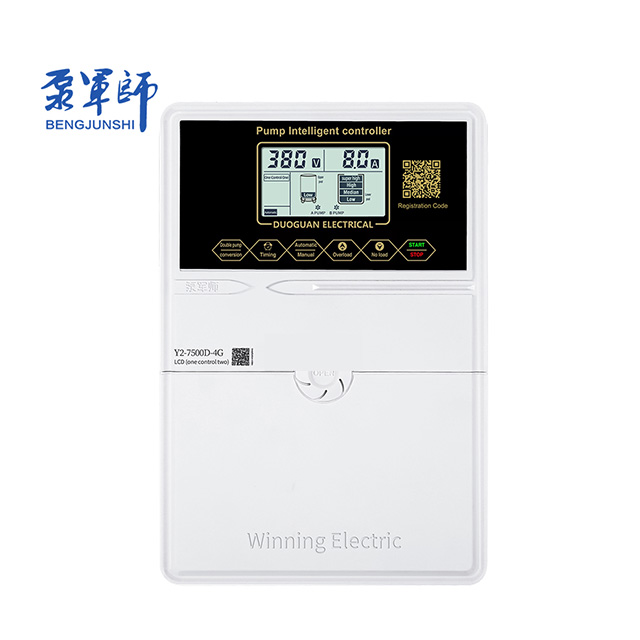In the age of automation, water pump controllers are critical to managing water resources efficiently and reliably. These devices do more than just turn a water pump on and off; they are key to ensuring long-lasting and efficient operation of water systems in residential, agricultural and industrial environments. This article will introduce you to water pump controllers as simply as possible, demonstrating the benefits of water pump controllers and the significant improvements they can bring to water management practices. Through our article, let you better understand the water pump controller. Learn their critical role in improving efficiency and reliability, and gain insights into features, selection and installation.

What is a water pump controller?
Simply put, a water pump controller automates the operation of a water pump. They manage the starting and stopping of water pumps based on different factors such as water level, pressure and flow, thereby minimizing manual intervention and maintaining an optimal water distribution system.
How the water pump controller works?
Controller type
·On/Off Control System: Basic controller for turning the pump on and off.
· Variable Frequency Drive (VFD): Adjusts water pump speed according to demand, improving efficiency.
·Pressure switches and float switches: Specialized switches that respond to specific changes in water level and pressure.
core components
·Sensors: Detect water level, pressure changes and flow.
·Control unit: parses sensor data and makes operational decisions.
· User interface: allows operators to customize settings and monitor system performance.
Benefits of using a water pump controller
·Improving efficiency: Automatically adjusts water pump operation to match demand, reducing waste of resources.
·Extended equipment life: Prevents water hammer, dry running and other common causes of wear and tear.
·Cost Savings: Reduce expenses by optimizing energy consumption and reducing maintenance costs.
·Remote management: Provides remote control and monitoring capabilities to enhance convenience and operational transparency.
Industry application
·Household use: ensuring stable water pressure and reliable water supply in residential buildings; optimizing water use in gardening and irrigation.
·Agriculture: Precisely control water distribution to crops and livestock based on environmental conditions.
·Industrial: Maintains cooling systems and treats water in manufacturing, supports efficient municipal water distribution and minimizes losses.
How to choose the right water pump controller?
Choosing the right water pump controller is a critical step in ensuring efficient, economical and reliable operation of your water pump system. Here are some important considerations to help you make an informed choice:
1. Determine the type and needs of the water pump
First, understand the type of water pump you need to control. Different types of water pumps (such as centrifugal pumps, submersible pumps, booster pumps, etc.) may require different controllers. Additionally, consider the environment in which the pump will be used (such as domestic, agricultural irrigation, or industrial applications) and the required flow and head.
2. Requirements for control functions
Evaluate the control features you need:
·Basic control: such as start/stop, overload protection, etc.
·Advanced functions: such as variable frequency control (VFD), pressure and float switch control, etc., which can automatically adjust the operating speed and pressure of the water pump according to actual needs.
·Smart Control: Modern water pump controllers may include integration with the Internet of Things (IoT), allowing for remote monitoring and control, as well as real-time data analysis.
3. Installation environment
Consider the environment in which the controller will be installed. If the environment contains high temperatures, humidity, or corrosive substances, special protective measures or a higher specification controller enclosure may be required. Additionally, environmental space constraints may also influence controller selection.
4. Budget constraints
Budget is an important factor in deciding what type of controller to purchase. Basic controllers are lower in price but have limited functions; high-end controllers, although the initial investment is higher, usually have long-term cost-saving advantages such as energy saving and efficient management.
5. Long-term maintenance and support
Consider the ease and cost of long-term maintenance. When choosing brands and suppliers, consider the quality of their after-sales service and technical support. Additionally, choosing a control system that is easy to maintain and upgrade can lead to greater cost and labor savings in the future.
6. User-friendliness
Whether the controller's interface is intuitive and easy to use is also an important factor. A good user interface can reduce operational errors and help non-professionals manage the system easily.
In summary, when selecting a water pump controller, you should consider the actual application needs, budget, and ease of operation and maintenance. Reasonable selection can not only improve the efficiency and reliability of the system, but also reduce the total cost of operation and maintenance in the long run.
Frequently Asked Questions About Water Pump Controllers
What is the main purpose of a water pump controller?
The main purpose is to automate and optimize the operation of water pumps, ensuring efficient use of resources and prolonging the lifespan of the system.
How does a variable frequency drive controller differ from a traditional on /off controller?
A VFD controller adjusts the motor speed of the pump based on demand, which significantly enhances efficiency and reduces wear, unlike traditional on/off controllers that operate at full capacity whenever on.
Can water pump controllers be used for all types of pumps?
Yes, most types of pumps can be integrated with a water pump controller, but the specific type of controller and setup might vary based on the pump's characteristics.
What are the signs that I might need a water pump controller?
Signs include frequent pump inconsistent water pressure, high energy bills related to pump operation, and noticeable stress on pumping equipment.
Are there wireless water pump controllers available?
Yes, modern water pump controllers often come with wireless connectivity options, allowing for remote monitoring and control through mobile devices.
conclusion
Water pump controllers are a transformative tool in the field of resource management, providing significant advantages in increasing efficiency and cost-effectiveness. With proper selection, installation and maintenance, these controllers can greatly improve the performance and reliability of any water system, ensuring the system runs smoothly with minimal human supervision.























